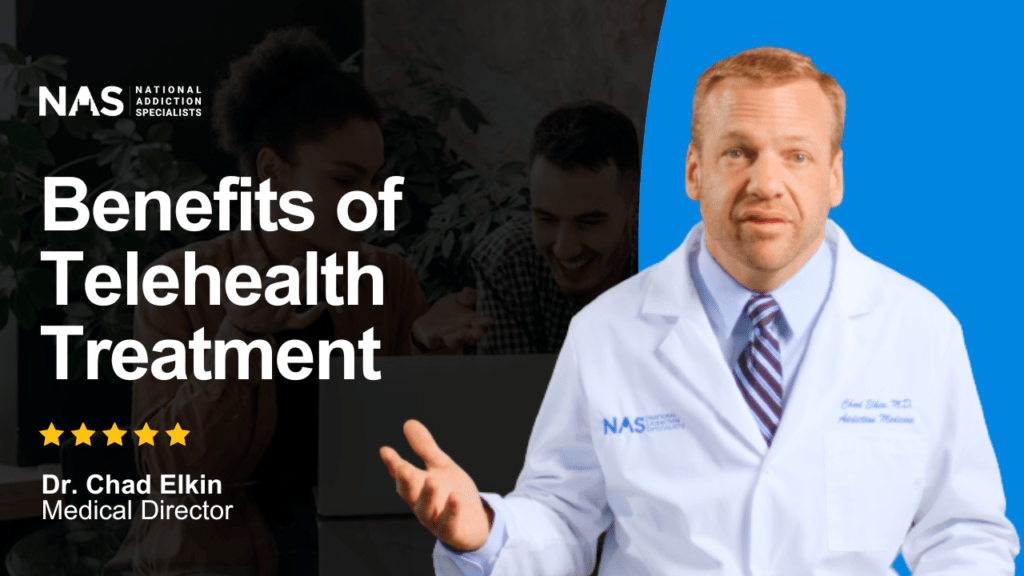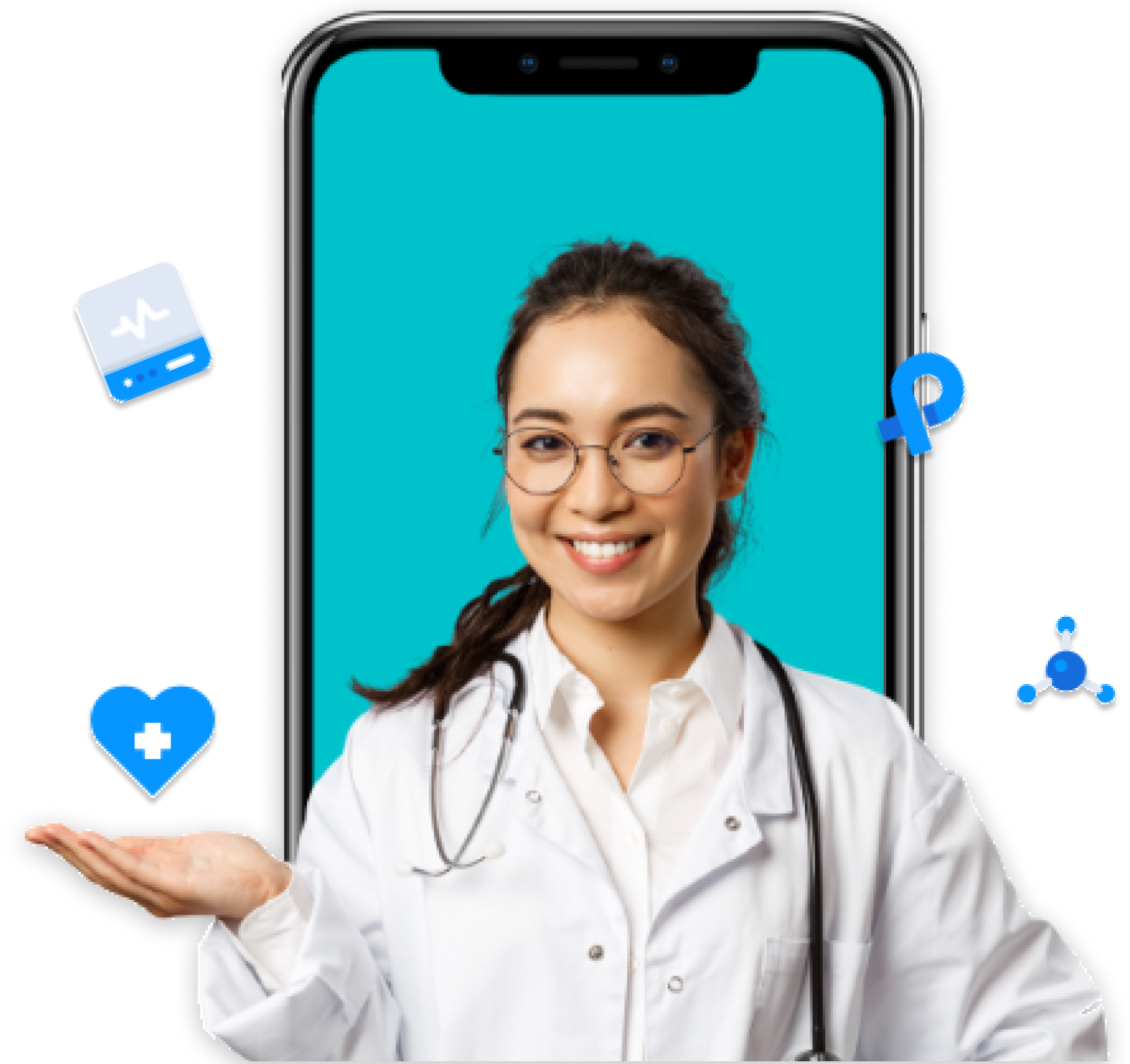The Digital Revolution in Mental Healthcare
Virtual counseling sessions have transformed how people access mental healthcare, offering therapy through secure video calls, phone sessions, and messaging platforms from the comfort of home. This modern approach to mental health treatment has exploded in popularity – four out of ten Americans have used online therapy since 2021.
What are Virtual Counseling Sessions?
- Video therapy: Face-to-face sessions via secure platforms
- Phone counseling: Voice-only therapeutic conversations
- Text-based therapy: Messaging with licensed therapists
- Hybrid approaches: Combining multiple communication methods
Key Benefits:
- Access therapy from anywhere with internet
- No travel time or transportation barriers
- Often more affordable than traditional therapy
- Greater privacy and reduced stigma
- Flexible scheduling around work and family
Who Can Benefit:
- Busy professionals and parents
- People in rural or underserved areas
- Individuals with mobility challenges
- Those seeking specialized addiction treatment
- Anyone preferring the comfort of their own space
The numbers speak for themselves: 98% of users find virtual therapy more convenient than face-to-face sessions, while 80% report it’s as effective or more effective than traditional in-person treatment.
I’m Dr. Chad Elkin, a board-certified addiction medicine physician and founder of National Addiction Specialists, where I’ve seen how virtual counseling sessions break down barriers to addiction treatment and mental healthcare. Through telehealth, we’ve helped countless individuals access life-saving therapy and medication-assisted treatment who might otherwise have gone without care due to stigma, distance, or scheduling conflicts.
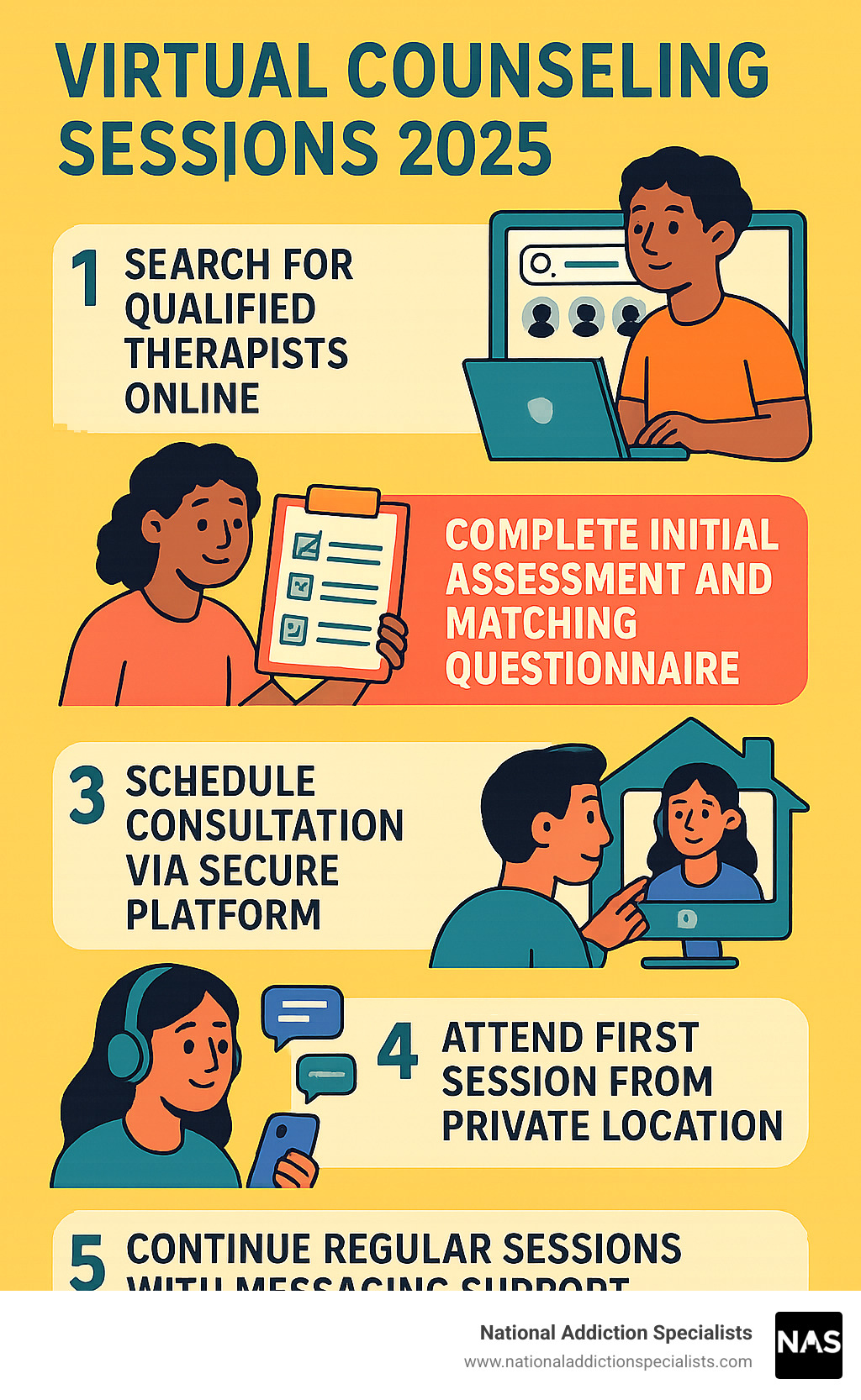
Important Virtual counseling sessions terms:
The Rise of Digital Mental Health: Benefits of Virtual Counseling
Virtual counseling sessions have revolutionized mental healthcare, making it more accessible than ever. Gone are the days of long commutes and waiting rooms; therapy is now just a click away.
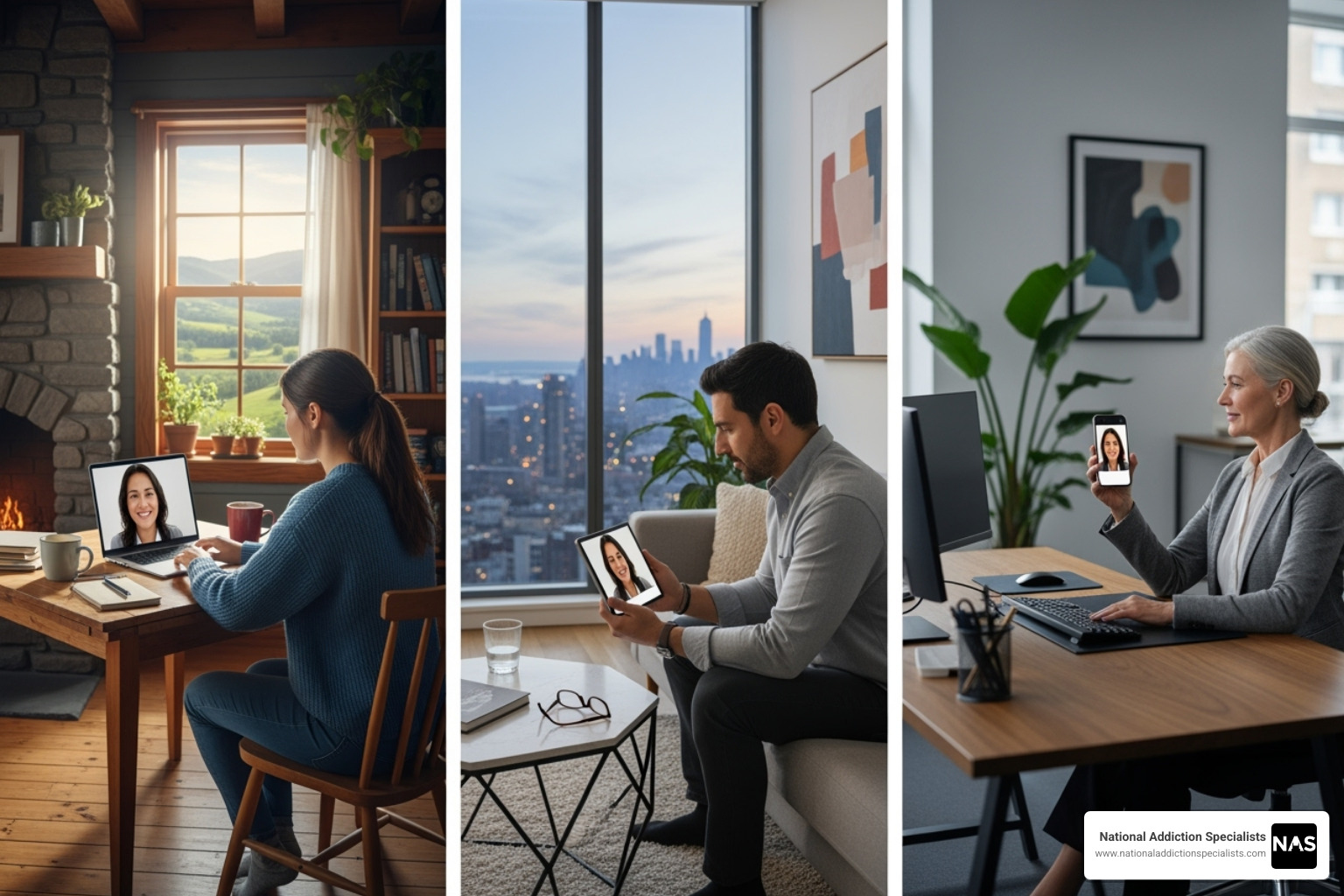
The primary benefit is accessibility. Quality mental healthcare is now available to everyone, from downtown Nashville to rural Virginia, eliminating the long drives previously required for many. For those with mobility issues, chronic pain, or disabilities, virtual sessions remove transportation stress. Therapy happens in the comfort of your own home.
The convenience is undeniable. With no commute or waiting rooms, 98% of people find virtual therapy more convenient than traditional sessions. Flexibility is key for busy parents and professionals, as sessions can fit into a lunch break or evening, making therapy compatible with real life.
Accessibility, Affordability, and Inclusivity
Virtual counseling opens doors for underserved populations. Rural communities can now access specialists for addiction recovery, trauma, and other specific concerns, ensuring a better therapeutic match. Inclusivity is another major benefit. It removes physical barriers for people with disabilities, eliminates the need for childcare, and offers a less stressful entry point for those with social anxiety.
Affordability is also a key advantage. Virtual counseling sessions often cost less than in-person therapy. Research shows online therapy can be more cost-effective for conditions like OCD, and many platforms accept FSA or HSA funds, making care more budget-friendly.
Virtual therapy powerfully reduces stigma. The privacy of online sessions removes the intimidation of visiting a clinic, which is a significant barrier in addiction treatment. At National Addiction Specialists, we’ve seen how this privacy and convenience helps people take that crucial first step. The importance of counseling in Suboxone treatment can’t be overstated, and virtual options make it easier to get both the medication and therapy needed.
Proven Effectiveness
Crucially, virtual counseling sessions are highly effective, with research backing their success. Studies show that 70% of people see improvement in anxiety or depression symptoms within three months. Furthermore, 80% of users report virtual therapy is as or more effective than face-to-face therapy, leading to life-changing results.
Cognitive Behavioral Therapy (CBT) is particularly effective online. Research shows online CBT is as effective as traditional in-person CBT for treating anxiety, depression, and stress, with some studies suggesting it may even be superior for certain individuals.
High satisfaction rates, with 71% of users finding virtual therapy more effective than in-person therapy, underscore its success. By removing barriers like travel and scheduling conflicts, clients can attend consistently, leading to better outcomes.
This effectiveness extends to addiction treatment. When people can access both medication-assisted treatment and counseling from home, they’re more likely to stay engaged in their recovery. The combination of convenience and proven results makes virtual counseling sessions a game-changer for mental health and addiction treatment.
How Do Virtual Counseling Sessions Work?
Understanding how virtual counseling sessions work reveals a straightforward process that brings therapy directly to you.
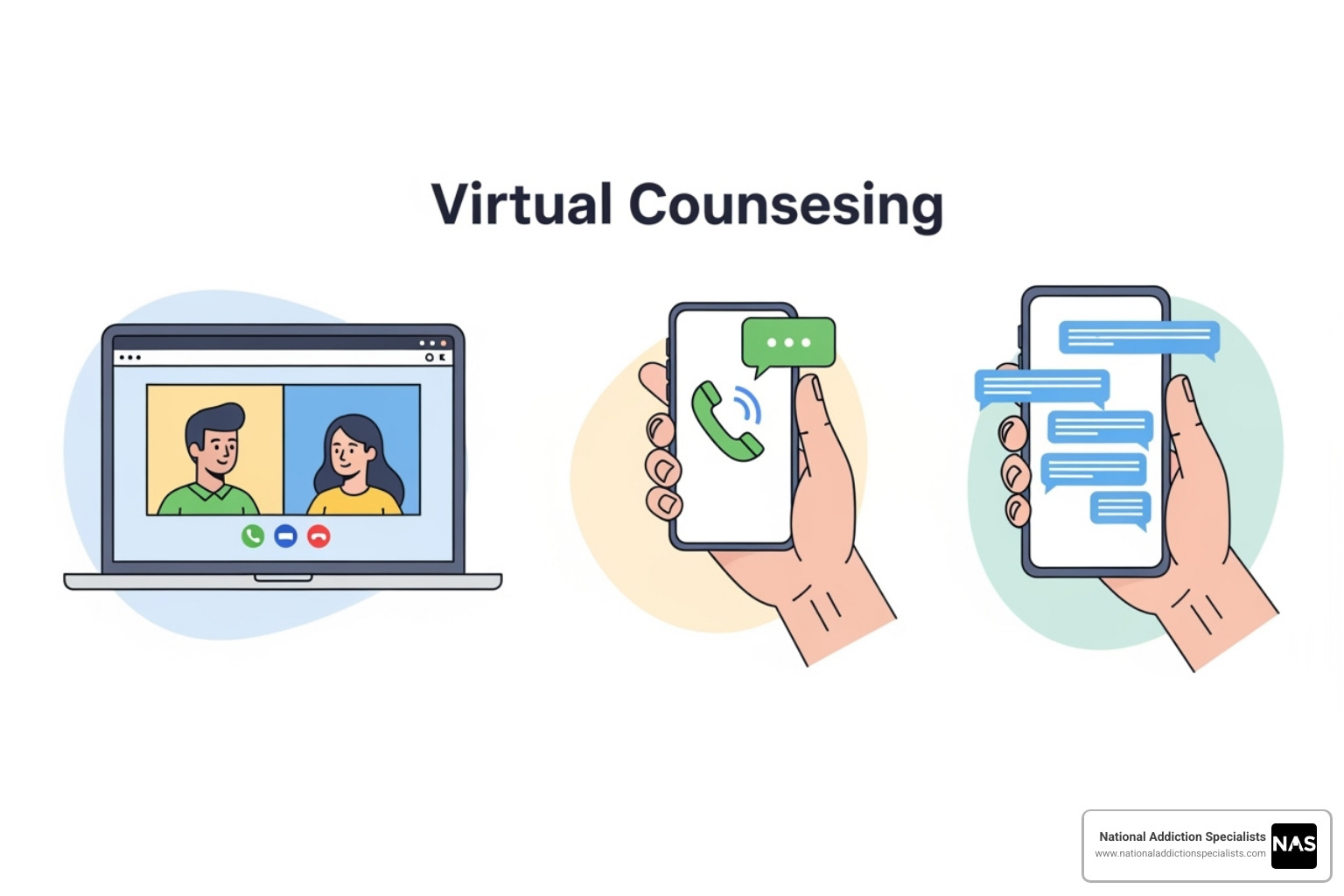
The flexibility of virtual counseling sessions is a key feature. Clients can connect via secure video calls for a face-to-face feel or use phone sessions for audio-only interaction, which some find easier for opening up. Text-based messaging is another option, ideal for those who prefer writing or need support between appointments. This can involve asynchronous messaging or real-time live chat sessions.
The client experience is seamless. After finding a therapist and completing an online assessment, you schedule your first session via a client portal. At the appointed time, you log in to the secure platform to begin.
Traditional vs. Virtual Counseling: Key Differences
While the heart of therapy remains unchanged, the format creates some meaningful differences worth understanding:
| Factor | In-Person Counseling | Virtual Counseling Sessions |
|---|---|---|
| Environment | Therapist’s office, neutral, structured | Client’s chosen space (home, office), flexible |
| Convenience | Requires travel, fixed location | No commute, accessible from anywhere with internet |
| Cost | Often higher due to overhead, travel costs | Can be more affordable, reduces indirect costs |
| Accessibility | Limited by geography, mobility, availability | Wide reach, overcomes physical and logistical barriers |
| Non-verbal Cues | Full body language, subtle shifts in posture | Primarily facial expressions, upper body, voice tone |
| Privacy | In-office privacy, potential for chance encounters | Digital privacy (secure platform), personal space control |
| Flexibility | Fixed appointment times, less adaptable | More flexible scheduling, options for messaging |
| Best-Fit Scenarios | Severe crises, complex conditions, young children, preference for physical presence | Busy schedules, remote locations, mild-moderate conditions, anxiety about in-person settings |
A common concern is the loss of non-verbal cues. While virtual sessions focus on facial expressions and upper body language, skilled therapists adapt by paying close attention to vocal tone and other details. Research shows the therapeutic alliance, or the bond between client and therapist, can flourish in virtual settings.
The session structure is similar to in-person therapy, providing dedicated time to work through challenges and develop coping strategies, but with the added comfort of being at home.
Technologies and Platforms Used
Secure technology is the backbone of effective virtual counseling sessions. At National Addiction Specialists, protecting sensitive addiction treatment information is a top priority. HIPAA-compliant software is essential, and all platforms must meet strict privacy and security standards.
Secure video conferencing and encrypted messaging portals use end-to-end encryption to ensure conversations remain private. Client portals act as a personal hub for scheduling, payments, and accessing resources, offering 24/7 convenience.
A stable internet connection is vital for a smooth session. Consistent connectivity is especially important in telehealth for opioid treatment, where maintaining the therapeutic connection is crucial.
Preparing for Your First Virtual Counseling Session
Getting ready for your first virtual counseling session is simple, but a little preparation helps you get the most from your time.
- Find a private, quiet space where you can speak openly without interruption. Inform others that you need privacy.
- Test your technology before the session. Check your device, internet, camera, and microphone to avoid technical delays.
- Set clear goals for what you hope to achieve in therapy. Having a sense of direction helps focus your sessions.
- Prepare questions for your therapist about their experience or approach. This helps you feel confident in their care.
- Minimize distractions by turning off notifications and closing other programs. Have water and tissues nearby for your comfort.
- Use good lighting so your therapist can see your facial expressions. Face a light source rather than having it behind you.
The goal is creating an environment where you feel safe, comfortable, and ready to do the important work of healing and growth.
Ensuring Effective and Ethical Online Therapy
Moving therapy online presents both opportunities and challenges. Success requires therapists and clients to work together to establish trust and steer the digital environment.

Practitioner responsibility includes using secure technology, following protocols, and adapting therapeutic skills. Client-side security involves protecting one’s own privacy and creating a safe space. Crisis management protocols are vital, and therapists must have clear plans to connect clients with local emergency services. Building digital rapport can be easier than expected, as the comfort of one’s own space often makes it less intimidating to open up.
Ethical Considerations: Confidentiality and Privacy
Your conversations deserve protection. Data encryption acts as a digital vault, scrambling communications so only you and your therapist can access them. Secure, HIPAA-compliant platforms are designed for healthcare and have multiple layers of protection. Using them demonstrates a therapist’s commitment to safeguarding your information.
The informed consent process for virtual counseling sessions is extensive. It should cover how the technology works, data privacy, potential risks, and contingency plans for technical issues or interruptions. Client-side digital privacy is simple but important: use strong passwords, secure your Wi-Fi, and find a private space for sessions to protect your confidentiality.
Professional guidelines continue evolving. Resources like the Ethical Framework for use of social media by mental health professionals help therapists steer these new waters responsibly.
Legal and Regulatory Guidelines
The legal landscape for virtual counseling sessions is governed by state-to-state licensing laws. A therapist must be licensed in the state where the client is physically located during the session. For example, a client in Tennessee requires a therapist with a Tennessee license. This rule ensures therapists know local resources and laws and are accountable to the state board. At National Addiction Specialists, we maintain proper licensing in both Tennessee and Virginia to serve our clients legally and ethically.
The Ryan Haight Act adds another layer of regulation for addiction treatment. This federal law requires in-person evaluations before prescribing controlled substances via telemedicine. Understanding Can MAT Suboxone Clinic Use Telehealth in State of Tennessee? requires navigating both federal and state requirements. These regulations exist to protect you and ensure virtual therapy maintains high professional standards.
Practitioner Competencies for Virtual Care
Excellent virtual counseling sessions require more than just a camera; therapists need a specific skill set adapted to the digital medium.
- Specialized training for telehealth is essential. It teaches therapists how to build rapport online, read digital cues, and manage the unique ethical considerations of virtual care.
- Digital communication skills are crucial. Therapists learn to focus on facial expressions and vocal tone and to manage technical issues with grace.
- Tech troubleshooting is a necessary skill. A therapist must be able to calmly guide a client through technical difficulties to avoid disrupting the session.
- Adapting therapeutic techniques for a virtual setting requires creativity. Therapists must modify in-person interventions for the screen and develop digital tools.
Professional organizations provide guidance through resources like the Standards for Technology in Social Work Practice, ensuring practitioners stay current with best practices.
Is Virtual Counseling Right for Everyone?
While virtual counseling sessions offer incredible benefits, they aren’t a perfect fit for every person or situation. Modern mental healthcare offers options, and understanding which approach—virtual or in-person—suits you best is key to effective care.
Make an Appointment to Treat Addiction
Please don’t hesitate. Make an appointment today.
Who Benefits Most from Virtual Counseling?
Virtual counseling sessions are particularly well-suited for certain individuals and circumstances:
- Busy Schedules: For those juggling work and family, the flexibility of online therapy is a game-changer, eliminating commutes and scheduling conflicts.
- Geographic Barriers: Virtual care removes geographic barriers, allowing people in remote areas like rural Tennessee or suburban Virginia to access specialized care like Virtual Addiction Counseling that may not be available locally.
- Social Anxiety or Agoraphobia: For those with social anxiety, virtual sessions provide a less overwhelming way to start therapy from a safe, comfortable space.
- Continuity of Care: This is a major advantage for those who travel or move frequently. As long as licensing requirements are met, you can maintain your therapeutic relationship from anywhere.
- Written Communication: For those who communicate better in writing, messaging-based therapy can be highly effective for processing thoughts and emotions.
Limitations and When to Seek In-Person Care
However, virtual counseling sessions have limitations, and in-person care is sometimes necessary:
- Severe Mental Health Crises: Situations like active psychosis or severe suicidal ideation require immediate, in-person intervention. In these cases, emergency services are the appropriate first call.
- Safety and Privacy Concerns: For those in domestic violence situations or who lack a private space, in-person therapy at a safe location is essential.
- Technology Barriers: Unreliable internet or discomfort with devices can hinder the therapeutic process. Additionally, some hands-on methods like play therapy are better suited for in-person settings.
Honesty with your provider is key. They can help you determine if virtual, in-person, or a hybrid approach is best for your needs. At National Addiction Specialists, we always prioritize what’s safest and most effective for each individual.
The Future of Mental Healthcare
The mental healthcare landscape is rapidly changing, with virtual counseling sessions leading a revolution toward a more integrated, personalized, and accessible system.
The future lies in hybrid therapy models that blend the best of virtual and in-person care. This allows for seamless transitions between formats based on a client’s needs. Telehealth is also facilitating the integration of mental health with primary care. This team-based approach, where doctors and therapists collaborate, leads to more comprehensive care.
The role of AI and VR in therapy is also growing. VR is being used for exposure therapy, while AI tools offer support between sessions. These technologies are valuable aids to human therapists, not replacements.
At National Addiction Specialists, we’re proud to be pioneers in this digital change, especially in addiction treatment. We’ve seen how virtual counseling sessions can literally save lives by reaching people who might never have sought help otherwise. Our expertise in telemedicine in Suboxone treatment shows how technology can deliver life-changing medication-assisted treatment alongside crucial counseling, all from the privacy and comfort of home.
The continued growth of telehealth isn’t just a trend—it’s a fundamental shift in how we think about healthcare delivery. At National Addiction Specialists, we provide convenient and confidential care for opioid addiction through virtual counseling sessions and medication-assisted treatment, ensuring that effective, compassionate support is always within reach, no matter where you are.
We’re committed to leveraging technology to break down the barriers that have kept too many people from getting the help they need. Whether it’s stigma, time constraints, or living in a rural area, virtual care is opening doors that were previously closed. Learn more about our Medication-Assisted Treatment program and see how the future of mental healthcare can work for you.
This article was medically reviewed by:
Chad Elkin, MD, DFASAM is a board-certified addiction medicine physician, founder, and Chief Medical Officer of National Addiction Specialists, dedicated to treating substance use disorders. A Distinguished Fellow of the American Society of Addiction Medicine (ASAM), Dr Elkin currently serves as President of the Tennessee Society of Addiction Medicine (TNSAM) and has held various leadership roles within the organization. Dr Elkin chairs ASAM’s Health Technology Subcommittee and is an active member of its Practice Management and Regulatory Affairs Committee, State Advocacy and Legislative Affairs Committee, and other committees. He also serves on the planning committee for the Vanderbilt Mid-South Addiction Conference. Committed to advancing evidence-based policy, Dr Elkin is Chairman of the Tennessee Association of Alcohol, Drug, & Other Addiction Services (TAADAS) Addiction Medicine Council, which collaborates with the TN Department of Mental Health & Substance Abuse Services (TDMHSAS). He has contributed to numerous local, state, and national task forces, helping develop professional guidelines, policies, and laws that align with best practices in addiction medicine. His work focuses on reducing addiction-related harm, combating stigma, and ensuring access to effective treatment.Passionate about the field of addiction medicine, he remains dedicated to shaping policy and enhancing patient care.
Suboxone® and Subutex® are a registered trademark of Indivior UK Limited. Any mention and reference of Suboxone® and Subutex® in this website is for informational purposes only and is not an endorsement or sponsorship by Indivior UK Limited.




